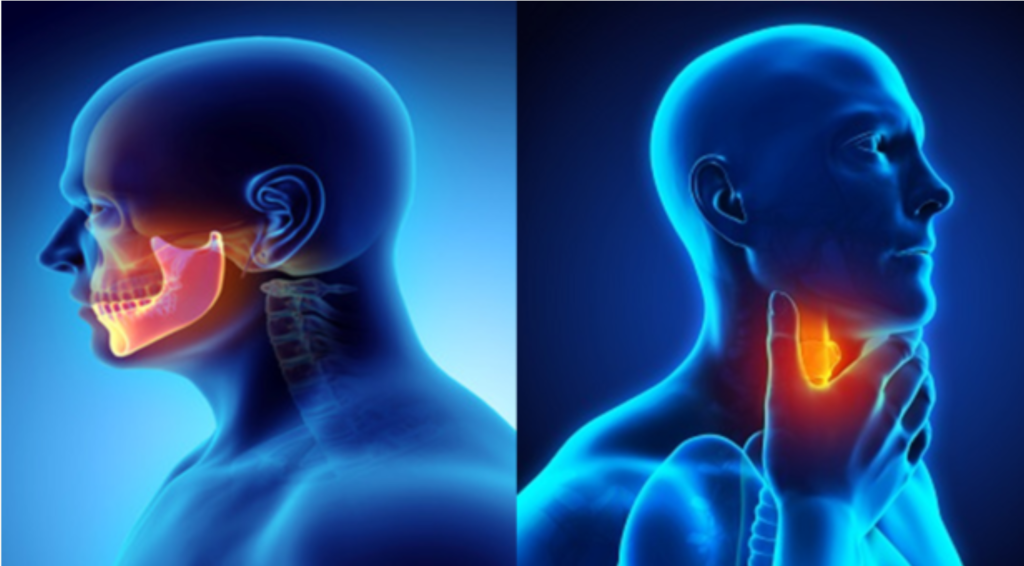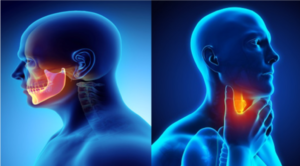As April dawns upon us, it’s important to recognize that it marks Head and Neck Cancer Awareness Month. Head and neck cancer refers to a group of cancers that originate in the oral cavity, throat, larynx, nose, sinuses, or salivary glands. This is a crucial time to raise awareness and emphasize the significance of early detection in combating this form of cancer. In this blog, we’ll talk about the symptoms, causes, diagnosis, and treatment options for head and neck cancer, highlighting the importance of awareness in saving lives.
Understanding Head and Neck Cancer:
Head and neck cancer can manifest in various ways, with symptoms often depending on the specific location where the cancer develops. In the mouth and throat, individuals may experience persistent sores that don’t heal, pain while swallowing, or a noticeable lump in the neck that can be felt through the skin. Other symptoms may include a hoarse voice, coughing up blood, loose teeth, or ear pain.
Similarly, in the nose, symptoms may present as nosebleeds or a persistent stuffy or blocked nose. Additionally, individuals might notice a sore on the skin of the face, neck, or lips that fails to heal or experience unexplained weight loss. Recognizing these symptoms early on can be crucial in seeking timely medical attention and initiating appropriate treatment.
Causes:
Several factors contribute to the development of head and neck cancer, including tobacco use (both smoking and smokeless), excessive alcohol consumption, human papillomavirus (HPV) infection, exposure to certain chemicals and pollutants, and poor oral hygiene. It’s essential to be mindful of these risk factors and take preventive measures where possible.
Diagnosis and Treatment:
Early detection plays a critical role in the successful treatment of head and neck cancer. Diagnosis typically involves a thorough physical examination, imaging tests (such as CT scans or MRIs), and biopsy to confirm the presence of cancerous cells. Treatment options vary depending on the stage and location of the cancer but may include surgery, radiation therapy, chemotherapy, targeted therapy, Immunotherapy, palliative care or a combination of these approaches.

Raising Awareness and Early Detection:
Raising awareness about head and neck cancer is key to promoting early detection and improving outcomes for patients. Encouraging individuals to recognise the symptoms and seek medical attention promptly can lead to earlier diagnosis and more effective treatment. Additionally, advocating for regular screenings, particularly for those at higher risk due to tobacco or alcohol use, can aid in the early detection of precancerous or cancerous lesions.
Conclusion
Early detection through regular screenings and prompt medical attention for symptoms can significantly improve the prognosis for individuals with head and neck cancer. As we observe Head and Neck Cancer Awareness Month this April, let’s unite in spreading awareness and encouraging early detection to save lives.
Frequently Asked Questions:
What are the risk factors for head and neck cancer?
Common risk factors include tobacco use (smoking and smokeless), excessive alcohol consumption, HPV infection, exposure to certain chemicals, and poor oral hygiene.
How can I recognise the symptoms of head and neck cancer?
Head and neck cancer can manifest in various ways, with symptoms often depending on the specific location where the cancer develops. It’s important to seek medical attention if you experience any of the related symptoms.
What can I do to reduce my risk of developing head and neck cancer?
Quitting smoking, limiting alcohol consumption, reduce the risk of HPV infection, maintaining good oral hygiene, and avoiding exposure to harmful chemicals can help reduce your risk of developing head and neck cancer.





